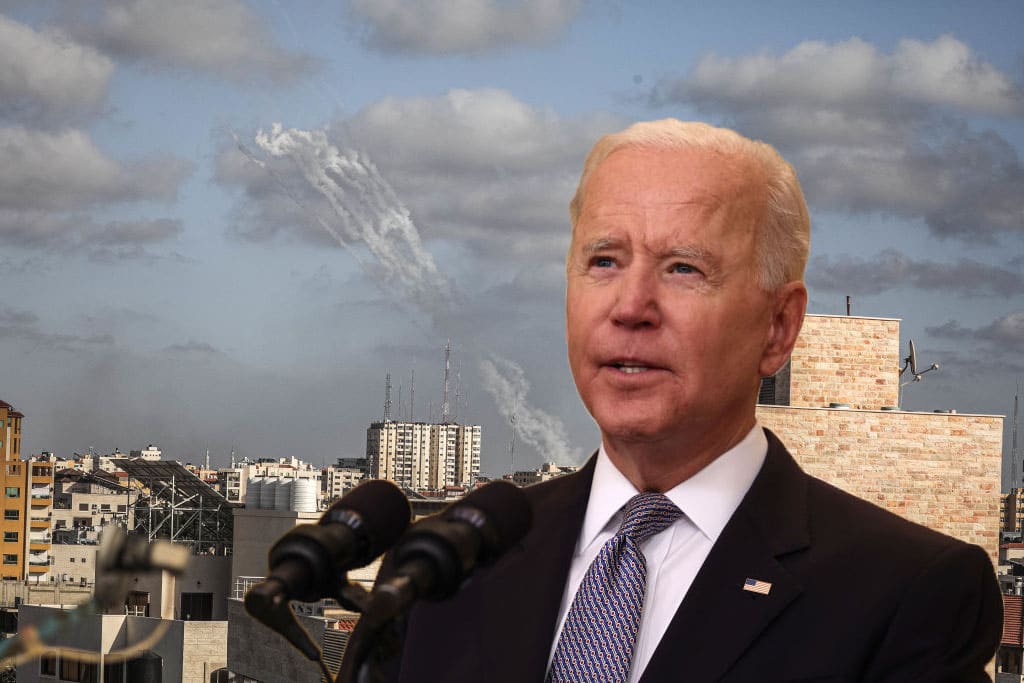 Composite (Israel photo by Fatima Shbair/Getty Images, Biden photo by Anna Moneymaker /Getty Images)
Composite (Israel photo by Fatima Shbair/Getty Images, Biden photo by Anna Moneymaker /Getty Images) Author’s note: This column was written before the tragic deaths of five Israelis at the hands of a Palestinian gunman near Tel Aviv on Tuesday. The broader points about the U.S. challenges in the Middle East are still valid, but the assessment of the relationship between Israel and the Palestinians is obviously not.
Joe Biden wasn’t the first U.S. president to think he could put the Middle East on the back burner while he focused on other global hot spots. Nor will he be the last to realize that the geopolitics of the region are far too tenuous to put the region on America’s foreign policy waiting list for long. But there might not be a precedent in modern history when deprioritizing the longtime tensions in the Mideast have carried such potentially grave consequences worldwide.
When any of Biden’s predecessors have tried to shift the Middle East to second-tier status, it has been because they recognized the intractability of the Israeli-Palestinian conflict and decided that expending their political capital to push for an unachievable peace was not a good use of their time, energy or influence when other parts of the world also demanded their attention.
When Biden took office, he quickly reviewed the seemingly hopeless deadlock in the West Bank and Gaza and came to precisely that conclusion. Except when the abbreviated war last summer between Israel and Hamas forced his hand, his administration’s only significant involvement in the region has been to push for a renewal of a nuclear agreement with Iran.
But even while hostilities between Israel and the Palestinians have returned to a low simmer, two other violent outbreaks have combined to worsen the fraught politics of the Middle East and the United States’ role there. The first is Russia’s invasion of Ukraine, which has created pressure on the U.S. and its allies to impose the most stringent sanctions possible against Vladimir Putin’s government, including a potential embargo against Russian oil imports. But Europe heavily depends on Russia for energy resources, and most European countries are reluctant to impose too much hardship on their own citizens.
These competing demands have dramatically elevated the importance of the Mideast’s oil-producing countries to an even higher level than normal. Simply put, the West needs Middle Eastern oil badly, more urgently than has been the case for several decades. But when Biden placed phone calls to the leaders of Saudi Arabia and the United Arab Emirates when the war in Ukraine began, neither the Saudis or Emiratis would take his call. That type of disregard from an ally is almost unheard of, but it becomes easier to understand once we examine the two countries’ other security interests.
Aside from the Russia-Ukraine war, the other military conflict that has created so many complications for the U.S. has been the terrorist uprising in Yemen by Houthi insurgents. This is the type of warfare which usually barely registers in the consciousness of most Americans, but both Saudi Arabia and the U.A.E. have played prominent roles in assisting the Yemeni government’s efforts to defeat the rebellion, and both have been repeatedly attacked by the rebels. Because of the strong support that Iran has extended to the Houthis, Yemen is now the scene of a proxy battle between the Middle East’s most prominent military powers.
The Saudis are already frustrated with the Biden Administration’s efforts to resurrect the Iranian nuclear deal (casting them as Israel’s low-key allies in attempting to stop the deal). Add Biden’s personal and public criticisms of Saudi Crown Prince Mohammed bin Salman, and the United States’ reluctance to make a larger commitment to protecting Saudi interests against the rebels has caused great consternation among many of the Gulf nations. Which means that at the precise moment when the West would benefit most from an increased oil supply from the Middle East to replace Russia’s energy imports, the countries who would be most able to provide those resources are nowhere to be found.
Europe needs gasoline. They can get it from either Putin or Saudi Arabia. It’s not hard to predict where Biden’s next fence-mending mission will take place.
Most presidents learn the hard way that the Middle East demands their attention in almost all circumstances, regardless of competing priorities in other parts of the world. But it’s rare that deprioritizing the region could have such an immense impact so far from Jerusalem and Riyadh. Europe needs gasoline. They can get it from either Putin or from Saudi Arabia. It’s not hard to predict where Biden’s next fence-mending mission will take place.
Dan Schnur is a Professor at the University of California – Berkeley, USC and Pepperdine. Join Dan for his weekly webinar “Politics in the Time of Coronavirus” (www/lawac.org) on Tuesdays at 5 PM.























 More news and opinions than at a Shabbat dinner, right in your inbox.
More news and opinions than at a Shabbat dinner, right in your inbox.